Sex educator Megan Maas has the scoop on 10 apps that can be very dangerous for your kids, and what you need to know about them.
You may be thinking your kids are downloading apps because they are
just a simple way for them to keep in contact with their friends. This
is certainly true for most kids, but unfortunately, even innocent use of
most of these apps can land a kid in a situation he/she never intended
to be in. Here are some apps that are popular among kids and why they
are potentially problematic for them:
1. Tinder: An app that is used for hooking-up
and dating. Users can rate profiles and find potential hook-ups via GPS
location tracking. 450 million profiles are rated every day! The good
news is, this app pulls information from user’s Facebook profiles, so it
is more authenticated than other apps.
Problem: It is easy for adults and minors to find one
another. Also, due to the rating system, it is often used for
cyber-bullying, because a group of kids can target another kid and
purposefully make his/her rating go down.
2. Snapchat: This app allows a user
to send photos and videos to anyone on his/her friend list. The sender
can determine how long the receiver can view the image and then the
image “destructs” after the allotted time.
Problem: It is the #1 app used for sexting, mostly
because people think it is the safer way to sext. However, the “snaps”
can easily be recovered and the receiver can take a screen shot and
share it with others. Also, a lot of images from Snapchat get posted to
revenge porn sites, called “snap porn.”
3. Blendr: A flirting app used to
meet new people through GPS location services. You can send messages,
photos, videos, rate the hotness of other users, etc.
Problem: There are no authentication requirements, so
sexual predators can contact minors, minors can meet up with adults. And
again, the sexting.
4. Kik Messenger: An instant messaging app
with over 100 million users that allows users to exchange videos, pics
and sketches. Users can also send YouTube videos and create memes and
digital gifs.
Problem: Kids using the app for sexting and sending
nude selfies through the app is common. The term “sext buddy” is being
replaced with “Kik buddy.” Kids use Reddit and other forum sites to
place classified ads for sex by giving out their Kik usernames. Also,
Kik does not offer any parental controls and there is no way of
authenticating users, thus making it easy for sexual predators to use
the app to interact with minors.
5. Whisper: Whisper is an anonymous
confession app. It allows users to superimpose text over a picture in
order to share their thoughts and feelings anonymously. However, you
post anonymously, but it displays the area you are posting from. You can
also search for users posting within a mile from you.
Problem: Due to the anonymity, kids are posting pics of
other kids with derogatory text superimposed on the image. Also, users
do not have to register to use Whisper and can use the app to
communicate with other users nearby through GPS. A quick look at the app
and you can see that online relationships are forming through the use
of this app, but you never know the person behind the computer or phone.
Sexual predators also use the app to locate kids and establish a
relationship. One man in Seattle, Wash., was charged with raping a 12-year-old girl he met on this app in 2013.
6. Ask.fm: Ask.fm is one of the
most popular social networking sites that is almost exclusively used by
kids. It is a Q&A site that allows users to ask other users
questions while remaining anonymous.
Problem: Kids will often ask repeated derogatory
questions that target one person. Due to the anonymity of the badgering,
it creates a virtually consequence-free form of cyber-bullying. Ask.fm
has been associated with nine documented cases of suicide in the U.S. and the U.K.
7. Yik Yak: An app that allows
users to post text-only “Yaks” of up to 200 characters. The messages can
be viewed by the 500 Yakkers who are closest to the person who wrote
the Yak, as determined by GPS tracking.
Problem: Users are exposed to and are contributing
sexually explicit content, derogatory language and personal attacks.
Although the posts are anonymous, kids start revealing personal
information as they get more comfortable with other users.
8. Poof: This app allows users to
make other apps “disappear” on their phone. Kids can hide any app they
don’t want you to see by opening the app and selecting other apps.
Problem: It’s obvious, right? Luckily, you can no
longer purchase this app. But, if it was downloaded before it became
unavailable, your child may still have it. Keep in mind that these types
of apps are created and then terminated quickly, but similar ones are
continuously being created. Others to look for: Hidden Apps, App Lock
and Hide It Pro.
9. Omegle: This app is primarily
used for video chatting. When you use Omegle, you do not identify
yourself through the service. Instead, chat participants are only
identified as “You” and “Stranger.” However, you can connect Omegle to
your Facebook account to find chat partners with similar interests. When
choosing this feature, an Omegle Facebook App will receive your
Facebook “likes” and try to match you with a stranger with similar
likes.
Problem: Sexual predators use this app to find kids to
collect personal information from in order to track them down more
easily in person.
10. Down: This app, which used to be called Bang With Friends,
is connected to Facebook. Users can categorize their Facebook friends
in one of two ways: They can indicate whether or not a friend is someone
they’d like to hang with or someone they are “down” to hook-up with.
Problem: Although identifying someone you are willing
to hook-up with doesn’t mean you will actually hook-up with them, it
creates a hook-up norm within a peer group. Depending on your sexual
values, this might be something you don’t want for your child. Also,
because of the classification system, a lot of kids will feel left out
or unwanted, which can lead to anxiety, etc.
The most important thing you can do as a parent to protect your
children from dangers that are associated with the use of these apps is
to talk with them frequently about their social lives. You can start by establishing yourself as an approachable parent and talking with them early and often about sexuality
and romantic relationships. Without a strong bond and open
communication, trying to regulate and monitor Internet use won’t be very
effective. However, setting technology boundaries (when and where they
access the Internet) and monitoring their online behavior can be
effective if you have a strong foundation to build on. You can access a
list of monitoring software I recommend here.
Just remember to keep on top of it, there is no software that can
eliminate risk or the need to parent. Ultimately, your goal is to raise
an individual who can manage his/her online and offline behavior in a
healthy way because he/she wants to. The process starts with you
nurturing a strong emotional bond, leading by example and setting the
boundaries. You can do it!
Thursday, 27 November 2014
Tuesday, 25 November 2014
The Top 25 Millionaires & Billionaires That Are Using Their Money To Save The World
When you think of the word “Philanthropist“, people such as Bill & Melinda Gates, Warren Buffett & Oprah Winfrey may come to mind. These are just a few of the many super rich that have devoted their lives to changing the world for the better through the riches and Success they have made over their lives. Read on to see the list of the Top 25 Richest Millionaires & Billionaires giving away their money to make this world a better place.
Billionaires Giving Away Money
#25 Lee and Jane Seidman

Net worth: Not available
Beneficiary: University Hospitals in Cleveland
Background: Seidman is the retired founder and president of the Motorcars Group, a Cleveland-based conglomerate of car dealerships. He pledged in 2010 to give away 90% of his wealth before the end of the year.
#24 Larry Ellison

Net worth: $39.5 billion (via Forbes)
Beneficiary: Ellison Medical Foundation
Background: Ellison, the founder of Oracle, started his foundation in 1997 for biomedical research.
#23 Bennett S. LeBow
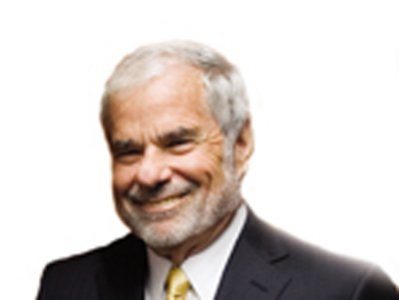
Net worth: Not available
Beneficiary: Drexel University
Background: LeBow is the chairman and CEO of Borders and chairman of the Vector Group, a holding company for manufacturers of cigarettes. He’s a graduate of Drexel and the university’s business school bears his name.
#19 (tie) P. Roy and Diana Vagelos

Net worth: $535 million (via the National Herald)
Beneficiary: Columbia University Medical Center
Background: Dr. Vagelos is the former CEO and chairman of pharmaceutical giant Merck. He’s an alumnus of the medical school associated with the hospital.
#19 (tie) Paul Ichiro Terasaki

Net worth: Not available
Beneficiary: University of California at Los Angeles
Background: Dr. Terasaki is a pioneer in the field of organ transplant medicine. In 1946 he developed the test that became the international standard method for tissue typing. He conducted his research in the university’s laboratories.
#19 (tie) Ming Hsieh

Net worth: $1.6 billion (via Forbes)
Beneficiary: University of Southern California
Background: Hsieh founded AMAX Information Technologies, a computer server and storage systems maker, and Cogent, which develops automated fingerprint-identification systems. He’s a graduate of the school, as well as a trustee.
#19 (tie) Ned Evans

Net worth: $6.5 billion (via Boston Magazine)
Beneficiary: Yale University
Background: Evans, who passed away last year, was a private investor and the chairman of publishing company Macmillan from 1979 to 1989. He was also a well-known horse breeder, as well as an alumnus of Yale.
#18 Charles E. Kaufman

Net worth: Not available
Beneficiaries: The Pittsburgh Foundation and other charities
Background: Kaufman, who passed away last year, was an investor and the former director of purchasing at pharmaceutical company Merck. His gift will support research in biology, chemistry, and physics
#17 Bill and Karen Ackman

Net worth: $700 million (via Forbes)
Beneficiary: Pershing Square Foundation
Background: Ackman is the founder of New York-based hedge fund Pershing Square Capital Management. Along with his wife, he created the Pershing Square Foundation in 2006 to support education, human rights, social entrepreneurship, and other causes.
#16 Pierre and Pam Omidyar

Net worth: $6.2 billion (via Forbes)
Beneficiaries: HopeLab, Humanity United, Omidyar Network, and the Ulupono Initiative
Background: Omidyar is the founder of eBay. His wife is the chairwoman of HopeLab, a nonprofit that develops technology to benefit chronically ill children.
#15 Henry C. Jr. and Jane Woods
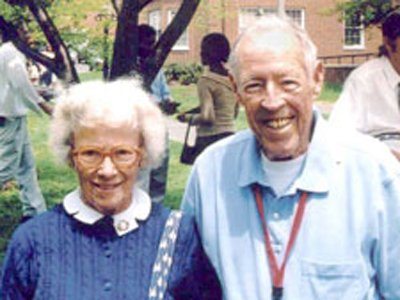
Net worth: Not available
Beneficiaries: Lawrenceville School and North Shore Country Day School
Background: Woods is the heir to the Sahara Coal Company fortune. The bulk of last year’s donation went to the Lawrenceville School, a private school in New Jersey from which he graduated and where he was a longtime teacher and chair of the English department.
#14 David and Patricia Atkinson

Net worth: Not available
Beneficiary: Cornell University
Background: Atkinson is a former partner of Miller, Anderson & Sherrerd, a money management firm. He now runs Atkinson & Company, a private investment business he owns with his wife. Their gift went towards a research center focusing on energy, sustainability and the environment.
#13 Juanita Kious Waugh

Net worth: Not available
Beneficiaries: The Mayo Clinic, Saint Joseph’s College in Indiana
Background: Waugh, who passed away last year, managed her family’s farms and was the heir to part of their cattle, farming and banking fortune. She and her parents had been patients of the Mayo Clinic.
#12 Terrence and Kim Pegula

Net worth: $3.1 billion (via Forbes)
Beneficiary: Pennsylvania State University
Background: Pegula founded East Resources, an oil and gas exploration and development company, which he sold to Royal Dutch Shell in 2010 for $4.7 billion. The donation from Pegula, an alumnus, will go towards the university’s hockey program.
#10 (tie) Mark Zuckerberg

Net worth: $17.5 billion (via Forbes)
Beneficiary: Startup: Education
Background: Zuckerberg, the founder of Facebook, made a huge donation to his own foundation, which will support programs that benefit the school system in Newark, N.J. The sum will be paid out over five years.
#10 (tie) Marc and Lynne Benioff
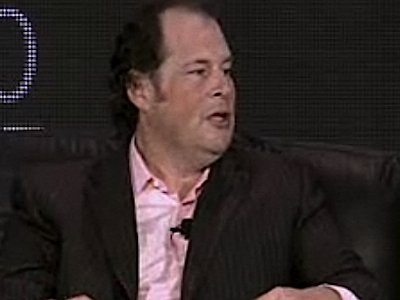
Net worth: $1.9 billion (via Forbes)
Beneficiary: University of California at San Francisco Children’s Hospital
Background: Benioff is the founder of Salesforce.com. His daughter was born at the hospital, and he is a member of its board.
#9 Meyer and Renee Luskin

Net worth: Not available
Beneficiary: University of California at Los Angeles
Background: Luskin is the chairman of Scope Industries, a major maker of animal feed. He is a graduate of UCLA and the couple’s gift will go towards a variety of academic programs.
#8 T. Boone Pickens

Net worth: $1.45 billion (via Forbes)
Beneficiaries: Oklahoma State University and other charities
Background: The founder of oil company Mesa Petroleum and energy investment firm BP Capital, Pickens is a graduate of OSU. His donation will endow need-based scholarships for students.
#7 Frances Lasker Brody

Net worth: Not available
Beneficiary:The Huntington Library, Art Collections, and Botanical Gardens
Background: Brody, who passed away in 2009, was the heir to both the fortune of her father, an advertising pioneer, and her husband Sidney Brody, a real estate magnate. She was a member of the library’s board of overseers, and her donation was largely funded by the sale of her vast art collection.
#6 Leonard Blavatnik

Net worth: $9.5 billion (via Forbes)
Beneficiary: University of Oxford
Background: Blavatnik is the founder of Access Industries, a major holding company. He did not attend Oxford, but decided the university was the right choice after learning that it wanted to create a school dedicated to “improving government and public-policy practices globally.”
#5 Edythe and Eli Broad
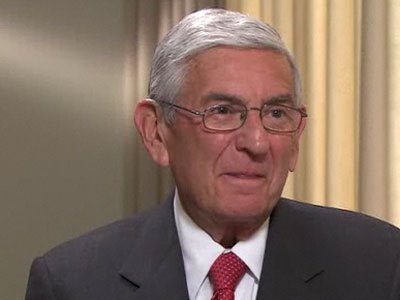
Net worth: $6.3 billion (via Forbes)
Beneficiary: Broad Foundations
Background: Broad is the founder and chairman of homebuilder KB Home Corporation and financial services company SunAmerica. The couple’s foundation supports civic programs, contemporary art museums, education, and medical and scientific research. Broad is also funding a new art museum in Los Angeles.
#4 Irwin and Joan Jacobs

Net worth: $1.15 billion (via Forbes)
Beneficiaries: University of California at San Diego Health System, Joan and Irwin Jacobs Fund at the Jewish Community Foundation of San Diego
Background: Jacobs is a co-founder of Qualcomm, the wireless communications company. The bulk of their donation went to the UCSD health system, which is building a new medical center to be named after the couple.
#3 T. Denny Sanford

Net worth: $600 million (via The Daily)
Beneficiaries: Sanford Health Foundation, Sanford-Burnham Medical Research Institute and the Florida Hospital for Children
Background: The noted philanthropist is chairman of United National Corporation, a banking business in South Dakota. His most recent gift to his foundation will establish a national institute for research and treatment of breast cancer.
#2 Michael R. Bloomberg

Net worth: $19.5 billion (via Forbes)
Beneficiaries: Arts, human services, public affairs, and other groups
Background: The founder of Bloomberg LP and Mayor of New York city gave to 970 different nonprofit groups in 2010. Since 2004, the first year the Philanthropy list was published, he has given away well over $100 million annually.
#1 George Soros

Net worth: $22 billion (via Forbes)
Beneficiary: Open Society Foundations
Background: Soros is a financier and the chair of Soros Fund Management, which manages hedge funds. He’s also the founder of Open Society Foundations, which supports human rights organizations and democratic institutions.
How Mark Cuban Made Billions Upon Billions
Dallas Mavericks owner and Billionaire “Shark Tank” Investor Mark Cuban has achieved success at unbelievable levels. His insatiable desire to succeed resembles a warrior or athlete as he handles his business with a “take no prisoners” approach.
Mark Cuban is said to be “one of the luckiest guys in business“, inking billion dollar deals at a young age that were said to only “sell in the 100 millions”.
Checkout the video by Bloomberg News below to discover How Mark Cuban made his Billions and read on as he shares his business advice for young aspiring entrepreneurs that are just starting out.
The Story of Mark Cuban’s Success
Mark Cuban’s Advice for Aspiring Entrepreneurs
“Go after it!The thing about being an entrepreneur is that it’s all to you. A lot of people like to make excuses, “I don’t have connections” or “I don’t have money”.If you find something that you love to do, be great at it and see if you can turn it into a business. Worse case is, you are going to have fun doing what you love to do and best case you are going to turn it into a successful business.I’m just not big on excuses.I think that everybody has the opportunity to go for it, you just have to do it.” – Mark Cuban
10 Major Differences Between The Successful & The Very Successful
There’s no denying that successful people are hard workers. They’re often the ones who put in the long hours, do the jobs that no one else wants to do and hustle until they get rewarded for it.
However, successful people should not be confused with very successful people.
Some people are simply more successful than others. This success often comes from lifestyle choices and habits they’ve picked up over the years, while other reasons stem from the way they prioritize their lives.
It’s clear how these 10 major lifestyle choices serve to differentiate the successful from the very successful.
The Very Successful…
1. Commit to Their Ever-Evolving Goals
The most significant difference between the successful and the very successful is the nature of their commitment. Successful people often pursue their goals with an unwavering, iron-willed perseverance.The very successful are equally as committed, but they recognize that their goals are constantly evolving. What you thought you wanted when you were a startup entrepreneur may be entirely different from what you want when you’re the CEO of a successful company. And that’s okay.
2. Say No, More Than They Say Yes
Successful people may agree to do everything, but very successful people are much more selective with their choices.Very successful people see the value behind their time, and will choose what they do accordingly. They don’t haphazardly say no, but rather eliminate nonessential activities or actions that won’t help them achieve their goals.
3. Get Joy From Their Jobs
Though clichéd, the idea of loving what you do does hold merit.If you’re committed to achieving a goal, you need to really want it. While you can’t avoid doing some things you don’t enjoy, very successful people get to where they are because they genuinely enjoy their jobs. You won’t hear the very successful bemoaning work-life balance, because their work is an essential part of their life.
4. Separate Work from Play
At the same time, very successful people know the importance of having down time. Many studies have already shown that working without taking a break can be detrimental to your health and your career.Very successful people see this down time as essential. For example, taking a walk outside or reading a book can help boost their creativity and give them more ideas for future projects.
5. They Challenge Themselves to Learn More
Complacency is antithetical to success.For the very successful, a day is wasted if they haven’t learned anything new. This doesn’t necessarily mean formal learning – some of the most innovative people don’t even have a bachelor’s degree. Rather, they’re constantly reading, learning from others around them and also learning from their own mistakes.
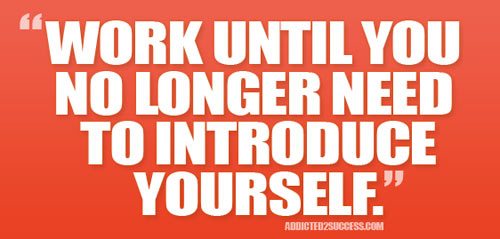
6. They Are Excellent Listeners
You don’t necessarily need to be the first person to answer a question in order to be very successful.Very successful people will listen to the people around them, perhaps to bounce off ideas or – more importantly – to listen to what isn’t being said.
7. They Welcome Criticism
In addition to being excellent listeners, very successful people not only listen to criticism, they welcome it with open arms.Abraham Lincoln once said, “He has a right to criticize, who has a heart to help.” Hearing only good things might make you feel better, but it won’t do much to help you grow and achieve your goals. Sometimes, you have to hear the criticisms to be able to make it to where you want to go.
8. They Take Care of Themselves
If you’re a very successful person, you know that you are the only person who can achieve the goals you have.Very successful people have internalized this and know the importance of taking care of themselves. Among the very successful, you’ll find devout proponents of meditation, sleep, and reading.
9. They Focus On Themselves, Not the Competition
Keeping up with the Joneses is still a recurring theme for many people and companies. They focus on what the competition is doing and try to one-up them.A very successful person isn’t worried about what the competition is doing – he’s worried about what he is doing. He’s thinking about what he can do better.
10. They Have Confidence in Themselves
If you’re going to achieve your goals, you have to be confident that what you’re doing is right. Very successful people don’t have time to be self-conscious. If you want to be very successful, you have to believe in yourself – after all, if you can’t believe in yourself, why should anyone else?Very successful people are self-driven and don’t hold themselves back with excuses. They learn from their mistakes and aim to be the best they can be.
7 Eccentric Rituals of Outstanding Leaders
If you want to succeed as an entrepreneur you have to think from a different angle.
You can’t think outside the box, you have to think as if the box doesn’t even exist.
Here are 7 amazing entrepreneurs that are leading the way in their fields using unorthodox rituals to change the game. Here they share their innovate approach to handling business.
If you are aspiring to succeed in business you may want to practice making some of these rituals part of your daily routine.
1. Richard Branson
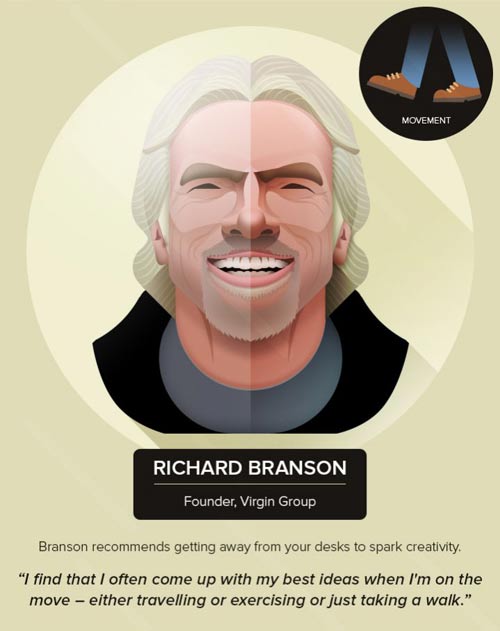
2. Arianna Huffington
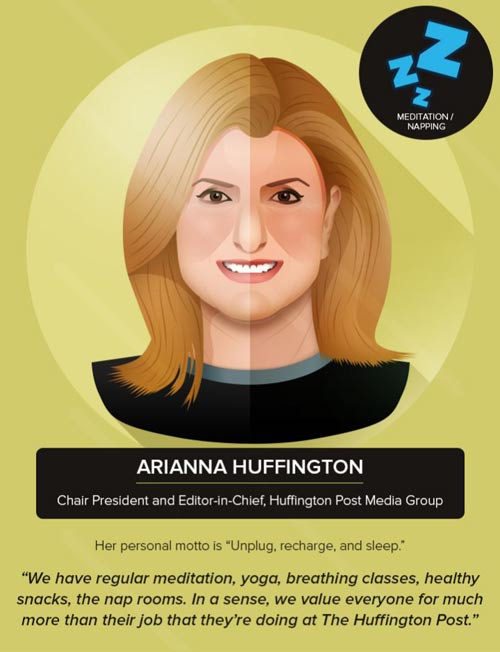
3. Jeff Bezos
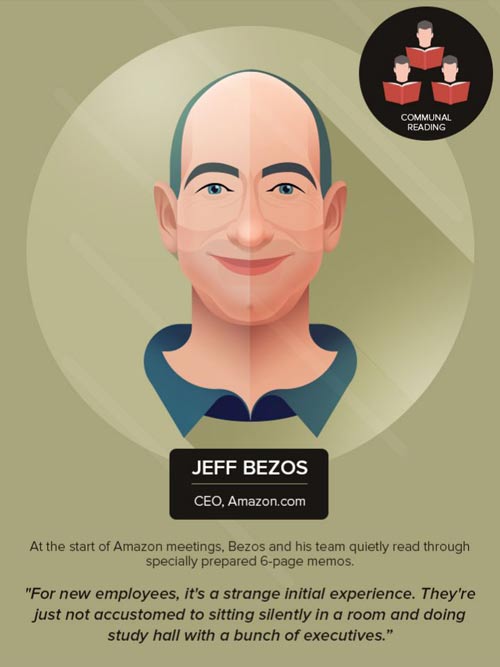
4. Elon Musk
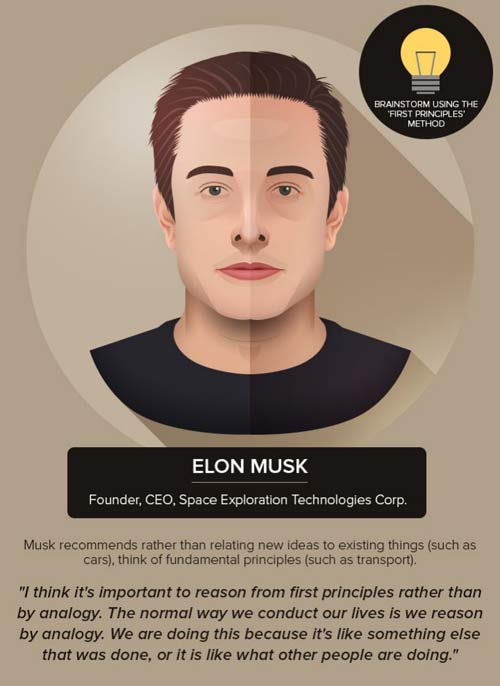
5. Warren Buffett
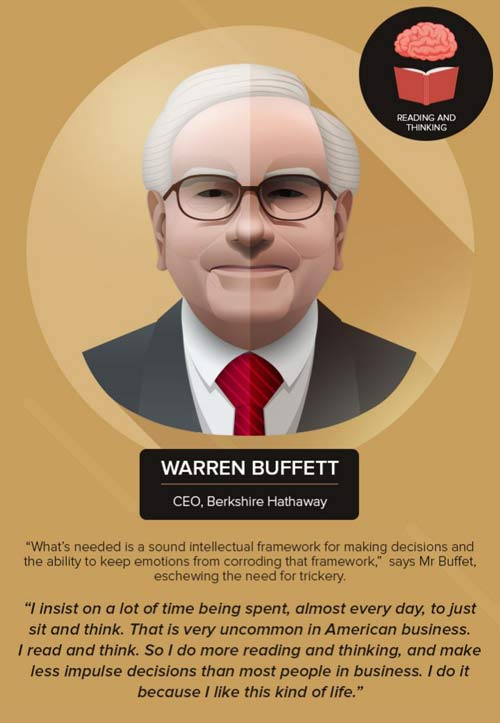
6. Michael O’Leary
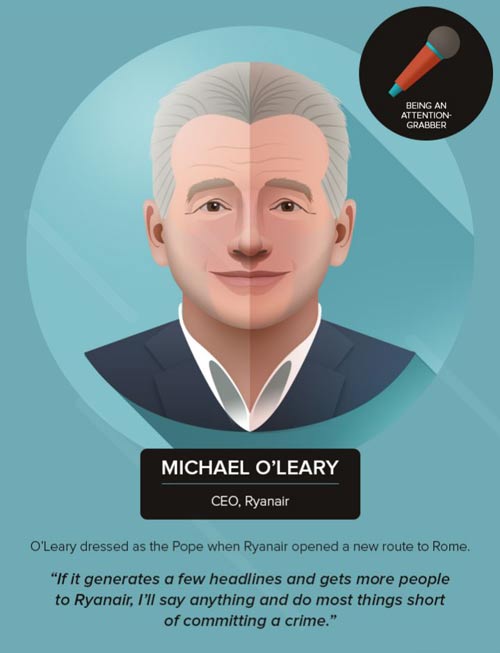
7. Mike Parker
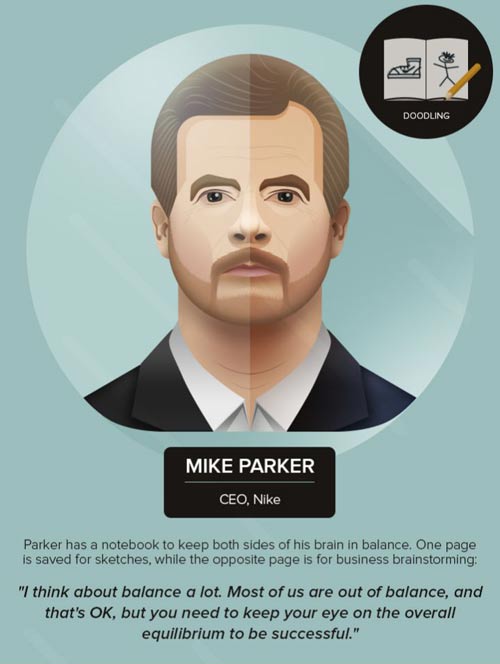
The 6 Basic Human Needs That Make Us Tick
I’ve seen it a million times–people equate their net worth with their self worth. Their identity is married so deeply to their bank statements and quarterly portfolio reports that they’ve forgotten that money is simply a vehicle for trying to meet our needs, almost all of which are not financial.
We’re all familiar with the cliche that money cannot
buy happiness, but I’m convinced that almost everybody has to learn that
lesson the hard way because let’s face it; the idea of having enough
money to throw at your problems until they’re solved is a seductive
impulse.
It certainly was something I constantly thought about
as a kid. Growing up, money was always out of reach. It was always a
source of stress because there was never enough of it. I remember
knocking on the neighbor’s door to ask for food for my brother and
sister and me.
Then, on a Thanksgiving Day when I was 11 years old,
something happened that changed my life forever. As usual, there was no
food in the house, and my parents were fighting. I heard someone
knocking at the front door. I opened it a crack and saw a man standing
on the steps with grocery bags filled with enough food for a big
Thanksgiving dinner. I could hardly believe it.
Fast forward several years to when I was 17. I saved
my money from working nights as a janitor and went out on Thanksgiving
and fed two families. It was one of the most moving experiences of my
life. I’d learned the joy of giving and to this day I consider
contribution to be one of the six most important things every person
needs.
Whatever emotion you’re after, whatever vehicle you
pursue—building a business, getting married, raising a family, traveling
the world—whatever you think your nirvana is, there are six basic,
universal needs that make us tick and drive all human behavior.
Combined, they are the force behind the crazy things (other) people do
and the great things we do. We all have the same six needs, but how we
value those needs and in what order, determines the direction of our
life.
Need 1: Certainty/Comfort
The first human need is the need for Certainty.
It’s our need to feel in control and to know what’s coming next so we
can feel secure. It’s the need for basic comfort, the need to avoid pain
and stress, and also to create pleasure. Our need for certainty is a
survival mechanism. It affects how much risk we’re willing to take in
life—in our jobs, in our investments, and in our relationships.
The higher the need for certainty, the less risk
you’ll be willing to take or emotionally bear. By the way, this is where
your real “risk tolerance” comes from.
Need 2: Uncertainty/Variety
Let me ask you a question: Do you like surprises?
If you answered “yes,” you’re kidding yourself! You
like the surprises you want. The ones you don’t want, you call problems!
But you still need them to put some muscle in your life. You can’t grow
muscle—or character—unless you have something to push back against.
Need 3: Significance
We all need to feel important, special, unique, or
needed. So how do some of us get significance? You can get it by earning
billions of dollars, or collecting academic degrees—distinguishing
yourself with a master’s or a PhD. You can build a giant Twitter
following. Or you can go on The Bachelor or become the next Real
Housewife of Orange County. Some do it by putting tattoos and piercings
all over themselves and in places we don’t want to know about.
You can get significance by having more or bigger problems than anybody else. “You think your husband’s a dirt bag, take mine for a day!” Of course, you can also get it by being more spiritual (or pretending to be).
Spending a lot of money can make you feel significant,
and so can spending very little. We all know people who constantly brag
about their bargains, or who feel special because they heat their homes
with cow manure and sunlight. Some very wealthy people gain
significance by hiding their wealth. Like the late Sam Walton, the
founder of Wal-Mart and for a time the richest man in America, who drove
around Bentonville, Arkansas, in his old pickup, demonstrating he
didn’t need a Bentley—but of course, he did have his own private fleet
of jets standing by.
Significance is also a money maker—that’s
where my dear friend Steve Wynn has made his fortune. The man who made
Las Vegas what it is today knows people will pay for anything they
believe is “the best,” anything that makes them feel special, unique or
important, anything that makes them stand out from the crowd. He
provides the most exclusive, luxurious experiences imaginable in his
casinos and hotels—they are truly magnificent and unmatched in the
world.
Need 4: Love & Connection
The fourth basic need is Love and Connection.
Love is the oxygen of life; it’s what we all want and need most. When
we love completely we feel alive, but when we lose love, the pain is so
great that most people settle on connection, the crumbs of love. You can
get that sense of connection or love through intimacy, or friendship,
or prayer, or walking in nature. If nothing else works, you can get a
dog.
These first four needs are what I call the needs of the personality.
We all find ways to meet these—whether by working harder, coming up
with a big problem, or creating stories to rationalize them. The last
two are the needs of the spirit. These are more rare—not everyone meets
these. When these needs are met, we truly feel fulfilled.
Need 5: Growth
If you’re not growing, you’re dying.
If a relationship is not growing, if a business is not growing, if
you’re not growing, it doesn’t matter how much money you have in the
bank, how many friends you have, how many people love you—you’re not
going to experience real fulfillment. And the reason we grow, I believe,
is so we have something of value to give.
Need 6: Contribution
Corny as it may sound, the secret to living is giving. Life’s not about me; it’s about we.
Think about it, what’s the first thing you do when you get good or
exciting news? You call somebody you love and share it. Sharing enhances
everything you experience.
Life is really about creating meaning.
And meaning does not come from what you get, it comes from what you
give. Ultimately it’s not what you get that will make you happy long
term, but rather who you become and what you contribute will.
Now think about how money can fulfill the six human
needs. Can money give us certainty? You bet. Variety? Check. Obviously
it can make us feel important or significant. But what about connection
and love? In the immortal words of the Beatles, money can’t buy you
love. But it can buy you that dog! And it can, unfortunately, give you a
false sense of connection because it attracts relationships, although
not always the most fulfilling kind. How about growth? Money can fuel
growth in business and in learning. And the more money you have, the
more you can contribute financially.
But here’s what I truly believe: if you value
Significance above all else, money will always leave you empty unless it
comes from a contribution you’ve made. And if you’re looking for
significance from money, it’s a high price to pay. You’re looking for
big numbers but it’s unlikely you’ll find big fulfillment.
The ultimate significance in life comes not from
something external, but from something internal. It comes from a sense
of esteem for ourselves, which is not something we can ever get from
someone else. People can tell you you’re beautiful, smart, intelligent,
the best, or they can tell you that you are the most horrible human
being on earth—but what matters is what you think about yourself.
Whether or not you believe that deep inside you are continuing to grow
and push yourself, to do and give more than was comfortable or you even
thought possible. The wealthiest person on earth is one who appreciates.

Thursday, 20 November 2014
15 Quick Tips That Will Help You Get Hired Fast
I’ve heard from job seekers who simply didn’t know some of the things that will help them effectively job search.
One person I spoke to recently didn’t know you should send a
thank you note after an interview. Another wasn’t aware that he didn’t
need to include all of his many years of experience on his resume.Some of the things on the list are little things that make a difference. Others are significant enough that they can make or break your job search. Here are 15 things you should know about job hunting that will help you find a new job quickly.
You can save time job searching by using advanced search options
on job boards. All the major job boards (like Indeed.com,
SimplyHired.com, CareerBuilder, Monster, and Dice) have an “Advanced
Search” option where you can search by keyword, location, a radius of a
location, job title, company, type of job, date posted and other
options. Here’s my list of the top 10 best job sites, and tips for using Advanced Job
Applying for every job you find isn’t always a good idea.
Focus your search on jobs that you’re qualified for. You’ll have a
better chance of getting selected for an interview. Sending out random
resumes and cover letters is just going to be a waste of time. Before
you start job hunting, take the time to decide what type of job you’re
seeking. Even better, come up with a target list of companies you’d like to work for and do your best to get noticed by them. Here’s how to get noticed by your dream company.
Don’t stop applying for jobs while you are waiting to
hear back from an employer. Most job seekers are rejected by over 15
employers before landing a job. Learn from your mistakes, and keep
applying until you get the right offer. Worst case scenario, you will
be juggling multiple job offers. That’s a good thing.
Wednesday, 19 November 2014
Why you will be hired for a JOB!
We’re looking for our next Noogler - someone who’s good for the role, good for Google and good at lots of things.
Things move quickly around here. At Internet speed. That means we have to be nimble, both in how we work and how we hire. We look for people who are great at lots of things, love big challenges and welcome big changes. We can’t have too many specialists in just one particular area. We’re looking for people who are good for Google—and not just for right now, but for the long term.
This is the core of how we hire. Our process is pretty basic; the path to getting hired usually involves a first conversation with a recruiter, a phone interview and an onsite interview at one of our offices. But there are a few things we’ve baked in along the way that make getting hired at Google a little different.
How we interview
We’re looking for smart, team-oriented people who can get things done. When you interview at Google, you’ll likely interview with four or five Googlers. They’re looking for four things:Leadership
We’ll want to know how you’ve flexed different muscles in different situations in order to mobilize a team. This might be by asserting a leadership role at work or with an organization, or by helping a team succeed when you weren’t officially appointed as the leader.Role-Related Knowledge
We’re looking for people who have a variety of strengths and passions, not just isolated skill sets. We also want to make sure that you have the experience and the background that will set you up for success in your role. For engineering candidates in particular, we’ll be looking to check out your coding skills and technical areas of expertise.How You Think
We’re less concerned about grades and transcripts and more interested in how you think. We’re likely to ask you some role-related questions that provide insight into how you solve problems. Show us how you would tackle the problem presented--don’t get hung up on nailing the “right” answer.Googleyness
We want to get a feel for what makes you, well, you. We also want to make sure this is a place you’ll thrive, so we’ll be looking for signs around your comfort with ambiguity, your bias to action and your collaborative nature.How we decide
There are also a few other things we do to make sure we’re always hiring the right candidate for the right role and for Google.We collect feedback from multiple Googlers
At Google, you work on tons of projects with different groups of Googlers, across many teams and time zones. To give you a sense of what working here is really like, some of your interviewers could be potential teammates, but some interviewers will be with other teams. This helps us see how you might collaborate and fit in at Google overall.Independent committees of Googlers help us ensure we’re hiring for the long term
An independent committee of Googlers review feedback from all of the interviewers. This committee is responsible for ensuring our hiring process is fair and that we’re holding true to our “good for Google” standards as we grow.These core principles are true across Google, but when it comes to specifics, there are some pieces of our process that look a little different across teams. Our recruiters can help you navigate through these as the time comes.
At Google, we don’t just accept difference - we celebrate it, we support it, and we
thrive on it for the benefit of our employees, our products and our community. Google is
proud to be an equal opportunity workplace and is an affirmative action employer.
Why Google doesn’t care about college degrees,
Google isn’t big on college degrees, although the search giant is inundated with applicants touting perfect GPAs from Ivy League schools.
Google’s chairman and head of hiring, Laszlo Bock, has given a few insights in the New York Times on how he sorts through a multitude of bright applicants.
The upshot is that Google values the skills and experiences that candidates get in college, but a degree doesn’t tell them much about talent or grit.
Many businesses “require” a college degree; at Google, the word “college” isn’t even its official guide to hiring. With the rise of self-paced college courses and vocational learning, plenty of driven people can teach themselves all of the necessary skills to work at the company.
College degrees are, almost by definition, a certificate of expertise. A degree in journalism is a giant badge meant to tell the world that you know at least a little bit about the trade of telling stories and interviewing people.
But a degree really doesn’t say what a graduate can do. Can they present an idea in front of a crowd? Can they build a website? Can they think interestingly about problems, or did they just pass some tests?
Logical thinking goes way beyond programming. For instance, back in 2010, Facebook put up a blog post claiming that political candidates with more fans were more likely to win their race, implying that getting more Facebook fans would improve their chances. In no uncertain terms, this was a phenomenally bad argument.
Maybe candidates who were already more popular just happened to have more fans. And what about candidates with fewer fans that won their races? In these cases, why did fans not matter?
The Facebook employees who ran the statistics understood some basic logic, but they didn’t demonstrate analytical thinking. Sifting through data requires training in the latest techniques for understanding causality and creatively exploring patterns (FYI: Facebook has gotten a lot better about these types of political claims since 2010).
For some people, college is just really easy. They can play 10 rounds of beer-pong until 4 a.m. and still ace an organic-chemistry exam the next day while their studious roommate is up to their eyeballs in color-coded flash cards and squeaks by with a B.
A college degree can’t tell Google whether an applicant is naturally smart or is a hard worker. Apparently, Google would rather mold someone with grit rather than someone who is a lazy high-achiever.
Both Bock and Schmidt are adamant that most people should go to college but that skills and experience are more important than the stamp of expertise. Bock says Google is looking for the kinds of projects candidates completed or what they accomplished at an internship.
I honestly can’t remember the last time someone asked me what my major in college was. If you want a job at Google (or some other prestigious company), don’t focus so much on your major, and make sure you graduate with all the skills and experiences you need to do awesome things in the world.
Google’s chairman and head of hiring, Laszlo Bock, has given a few insights in the New York Times on how he sorts through a multitude of bright applicants.
The upshot is that Google values the skills and experiences that candidates get in college, but a degree doesn’t tell them much about talent or grit.
You don’t need a college degree to be talented
“When you look at people who don’t go to school and make their way in the world, those are exceptional human beings. And we should do everything we can to find those people,” Bock said.Many businesses “require” a college degree; at Google, the word “college” isn’t even its official guide to hiring. With the rise of self-paced college courses and vocational learning, plenty of driven people can teach themselves all of the necessary skills to work at the company.
Demonstrate a skill, not an expertise
“If you take somebody who has high cognitive ability, is innately curious, willing to learn and has emergent leadership skills, and you hire them as an HR person or finance person, and they have no content knowledge, and you compare them with someone who’s been doing just one thing and is a world expert, the expert will go: ‘I’ve seen this 100 times before; here’s what you do,'” Bock said.College degrees are, almost by definition, a certificate of expertise. A degree in journalism is a giant badge meant to tell the world that you know at least a little bit about the trade of telling stories and interviewing people.
But a degree really doesn’t say what a graduate can do. Can they present an idea in front of a crowd? Can they build a website? Can they think interestingly about problems, or did they just pass some tests?
Logic is learned, and stats are superimportant
“Humans are by nature creative beings, but not by nature logical, structured-thinking beings. Those are skills you have to learn,” Bock said. “I took statistics at business school, and it was transformative for my career. Analytical training gives you a skill set that differentiates you from most people in the labor market.”Logical thinking goes way beyond programming. For instance, back in 2010, Facebook put up a blog post claiming that political candidates with more fans were more likely to win their race, implying that getting more Facebook fans would improve their chances. In no uncertain terms, this was a phenomenally bad argument.
Maybe candidates who were already more popular just happened to have more fans. And what about candidates with fewer fans that won their races? In these cases, why did fans not matter?
The Facebook employees who ran the statistics understood some basic logic, but they didn’t demonstrate analytical thinking. Sifting through data requires training in the latest techniques for understanding causality and creatively exploring patterns (FYI: Facebook has gotten a lot better about these types of political claims since 2010).
Prove grit
“It looks like the thing that separates out the capable students from the really successful ones is not so much their knowledge…but their persistence at something,” Google chairman, Eric Schmidt said.For some people, college is just really easy. They can play 10 rounds of beer-pong until 4 a.m. and still ace an organic-chemistry exam the next day while their studious roommate is up to their eyeballs in color-coded flash cards and squeaks by with a B.
A college degree can’t tell Google whether an applicant is naturally smart or is a hard worker. Apparently, Google would rather mold someone with grit rather than someone who is a lazy high-achiever.
If you go to college, focus on skills
“My belief is not that one shouldn’t go to college … most don’t put enough thought into why they’re going and what they want to get out of it,” Block said.Both Bock and Schmidt are adamant that most people should go to college but that skills and experience are more important than the stamp of expertise. Bock says Google is looking for the kinds of projects candidates completed or what they accomplished at an internship.
I honestly can’t remember the last time someone asked me what my major in college was. If you want a job at Google (or some other prestigious company), don’t focus so much on your major, and make sure you graduate with all the skills and experiences you need to do awesome things in the world.
I’m a Mommy Blogger and Proud of It
Call a woman a “mommy blogger” and you might as well be slinging mud.
The expression, as it is most commonly used, is patronizing at best,
derogatory at worst. What’s more is that it manages to offend on dual
levels: a seeming contempt for both motherhood and the way mothers write about themselves. And yet, suffice it to say: I am a mommy blogger and proud of it.
Before I became a mommy blogger, I wrote a monograph titled The Advent of Pluralism: Diversity and Conflict in the Age of Sophocles. The book was about the meta-ethical theory of pluralism as it manifested itself in pre-Platonic Greek thought. Now I have a website, where I write about parenting and children—the tragedy of sibling rivalry as much as the comedy of a six year old’s staged wedding. Is this a change in subject matter tantamount to a fall from grace? I imagine many among the literati would consider it so.
The idea that motherhood is a topic worthy of serious reflection is only in its infancy. “Women have mothered since life began,” writes Katherine J. Barrett, the editor of Understorey Magazine, an online publication dedicated to “unspoken” stories about mothering. But “the history of books about motherhood spans roughly 40 years.” Whatever the root cause of this fundamental imbalance—and I suspect it’s closely linked to the general undervaluing of what was once referred to as “women’s work”—times they are a changin’. Today the web is crawling with women trying to make sense of their topsy-turvy lives as parents by encapsulating that process of analysis in some kind of narrative form.
Blogging serves as an emotional and intellectual outlet for mothers, but it is becoming more than that too. Now mommy blogging is a new line of “women’s work.” As is true for many of my fellow bloggers, my original career path careened off its track once I had children. And because my previous existence as an academic—like the lawyers and publicists and educators I know who occupy the mommy blogosphere with me—had natural touching points with the written word, it wasn’t terribly surprising that I turned to the keyboard for something to do, for a way back to myself, when the babies came one after the other and I decided to stay home with them. Nor was it surprising that the creatures who filled my days would also be the ones who filled my pages.
Nobody, of course, objects to writing about motherhood or children in principle. Mommy blogging gets a bad rap in particular because of its origins in a certain sort of confessional writing that can be traced back to the “weblogs” of the early noughties. Lisa Belkin, herself the creator of the New York Times’ Motherlode blog, describes one of these prototypes, dooce.com, as “a daily reality show on a smaller screen.” That is to say: gritty, highly personal and animated by a sense of “the wartier, the better.”
This “bad mother,” “oversharenting” rendition of the mommy blog is one of the most popular, the locus classicus of the genre. It is a trope made famous by Ayelet Waldman in her 2009 book and the fodder for hugely popular websites like Scary Mommy. Here we have women chronicling their mundane parenting “fails,” but also, in a more sublime vein, probing the ambiguity they feel about becoming mothers in the first place. It’s easy to dismiss this type of writing as navel-gazing fluff, the epitome of the first-world problem. But the psychological effect of being able to articulate such feelings in a public space, in an age when parenting is an increasingly isolated and pressured endeavor, is not to be underestimated.
And yet, just because these essays have healing power doesn’t make them especially literary (though some, like Waldman’s, invariably are). That’s fair enough. What skeptics have to realize, however, is that the self-deprecating, bad-mommy blog is only one fish caught by a rather large net. For as it has evolved over the last decade, mommy blogging has moved beyond the merely confessional to blossom into a multi-faceted branch of the online publication industry. “Mommy lit,” as Barrett urges, has indeed grown up. One need only look at the highbrow creative nonfiction at sites such as Brain, Child Magazine or the important advocacy work being done on topics such as special needs and postpartum depression.
Furthermore, parenting writing is no longer its own contained niche. It is stretching its tentacles into other fields, with sophisticated results. Revered humor sites such as McSweeney’s Internet Tendency publish parenting pieces. Prestigious literary magazines such as the Rumpus and cultural magazines such as Aeon do as well. There is rigorous evidence-based analysis of salient childcare questions at Slate’s Double X. Major broadsheets such as The New York Times and The Washington Post have their own parenting blogs. And they even publish parenting-themed articles in their regular opinion and style sections.
Do these articles still count as “mommy blogging”? I submit that they do. Because what they all have in common is the belief by the women who penned them that their lives as mothers—their struggles as much as their successes—are worthy of documentation and publication, that they are, in fact, worthy of the craft of writing itself. This is the true legacy of the mommy blog and it is one we should embrace because of the label’s groundbreaking beginnings, not in spite of it.
For what we are doing as mommy bloggers, with our diverse voices and approaches, is a collective exercise in cultural counterpoint. It is a backlash against the myth that parenting is something to be done and not discussed or valued and it is a backlash against the debilitating contemporary notion that there is only one right way to do it. And for those of us who write about motherhood when we could be writing instead about, say, the ancient Greeks, it is a way to use history or philosophy or whatever other tools we have at our disposal to better understand the essence of our shared humanity and, in turn, to better understand ourselves.
Before I became a mommy blogger, I wrote a monograph titled The Advent of Pluralism: Diversity and Conflict in the Age of Sophocles. The book was about the meta-ethical theory of pluralism as it manifested itself in pre-Platonic Greek thought. Now I have a website, where I write about parenting and children—the tragedy of sibling rivalry as much as the comedy of a six year old’s staged wedding. Is this a change in subject matter tantamount to a fall from grace? I imagine many among the literati would consider it so.
The idea that motherhood is a topic worthy of serious reflection is only in its infancy. “Women have mothered since life began,” writes Katherine J. Barrett, the editor of Understorey Magazine, an online publication dedicated to “unspoken” stories about mothering. But “the history of books about motherhood spans roughly 40 years.” Whatever the root cause of this fundamental imbalance—and I suspect it’s closely linked to the general undervaluing of what was once referred to as “women’s work”—times they are a changin’. Today the web is crawling with women trying to make sense of their topsy-turvy lives as parents by encapsulating that process of analysis in some kind of narrative form.
Blogging serves as an emotional and intellectual outlet for mothers, but it is becoming more than that too. Now mommy blogging is a new line of “women’s work.” As is true for many of my fellow bloggers, my original career path careened off its track once I had children. And because my previous existence as an academic—like the lawyers and publicists and educators I know who occupy the mommy blogosphere with me—had natural touching points with the written word, it wasn’t terribly surprising that I turned to the keyboard for something to do, for a way back to myself, when the babies came one after the other and I decided to stay home with them. Nor was it surprising that the creatures who filled my days would also be the ones who filled my pages.
Nobody, of course, objects to writing about motherhood or children in principle. Mommy blogging gets a bad rap in particular because of its origins in a certain sort of confessional writing that can be traced back to the “weblogs” of the early noughties. Lisa Belkin, herself the creator of the New York Times’ Motherlode blog, describes one of these prototypes, dooce.com, as “a daily reality show on a smaller screen.” That is to say: gritty, highly personal and animated by a sense of “the wartier, the better.”
This “bad mother,” “oversharenting” rendition of the mommy blog is one of the most popular, the locus classicus of the genre. It is a trope made famous by Ayelet Waldman in her 2009 book and the fodder for hugely popular websites like Scary Mommy. Here we have women chronicling their mundane parenting “fails,” but also, in a more sublime vein, probing the ambiguity they feel about becoming mothers in the first place. It’s easy to dismiss this type of writing as navel-gazing fluff, the epitome of the first-world problem. But the psychological effect of being able to articulate such feelings in a public space, in an age when parenting is an increasingly isolated and pressured endeavor, is not to be underestimated.
And yet, just because these essays have healing power doesn’t make them especially literary (though some, like Waldman’s, invariably are). That’s fair enough. What skeptics have to realize, however, is that the self-deprecating, bad-mommy blog is only one fish caught by a rather large net. For as it has evolved over the last decade, mommy blogging has moved beyond the merely confessional to blossom into a multi-faceted branch of the online publication industry. “Mommy lit,” as Barrett urges, has indeed grown up. One need only look at the highbrow creative nonfiction at sites such as Brain, Child Magazine or the important advocacy work being done on topics such as special needs and postpartum depression.
Furthermore, parenting writing is no longer its own contained niche. It is stretching its tentacles into other fields, with sophisticated results. Revered humor sites such as McSweeney’s Internet Tendency publish parenting pieces. Prestigious literary magazines such as the Rumpus and cultural magazines such as Aeon do as well. There is rigorous evidence-based analysis of salient childcare questions at Slate’s Double X. Major broadsheets such as The New York Times and The Washington Post have their own parenting blogs. And they even publish parenting-themed articles in their regular opinion and style sections.
Do these articles still count as “mommy blogging”? I submit that they do. Because what they all have in common is the belief by the women who penned them that their lives as mothers—their struggles as much as their successes—are worthy of documentation and publication, that they are, in fact, worthy of the craft of writing itself. This is the true legacy of the mommy blog and it is one we should embrace because of the label’s groundbreaking beginnings, not in spite of it.
For what we are doing as mommy bloggers, with our diverse voices and approaches, is a collective exercise in cultural counterpoint. It is a backlash against the myth that parenting is something to be done and not discussed or valued and it is a backlash against the debilitating contemporary notion that there is only one right way to do it. And for those of us who write about motherhood when we could be writing instead about, say, the ancient Greeks, it is a way to use history or philosophy or whatever other tools we have at our disposal to better understand the essence of our shared humanity and, in turn, to better understand ourselves.
Zuckerberg's one piece of advice for struggling entrepreneurs
Facebook CEO Mark Zuckerberg answered questions yesterday during a live public Q&A about the future of the social network. The last question was asked by a shy 8th grader from a local school; she wanted to know how he forged through the hard times in the early Facebook days.
Zuckerberg’s answer was simple: Don’t go it alone. He faulted the media for propping up startup celebrities as superhuman, as though they can tackle any problem by themselves.
“No person knows how to deal with everything. But if you can find a team of people, or friends, or family — and there will be different people over time because different people like to focus on different problems or different scales of the problems — then that’s what’s really going to get you through, that’s what’s gotten me through and that’s what continues to get me through all the stuff that we have. Yeah, you don’t have to be superhuman, you have to just kind of keep on going and not do it alone and find people who share your passion for what is the important thing in the world.”Interestingly enough, at Stanford this week, Linkedin cofounder Reid Hoffman gave a lecture on the exact same topic, although he gave more specific advice about how to leverage local and personal networks to found a great tech startup. Both he and Zuckerberg said that it’s better for a startup to have more than one founder.
“What great founders do is seek the networks that will be essential to their task…Usually it’s best to have two or three people on a team, rather than a solo founder,” Hoffman said.
For more Zuckerberg, watch his first town hall Q&A here.
Tuesday, 18 November 2014
7 Key Steps Toward Starting Your Own Business
A lot of people think starting a business is hard. Too many
would-be-entrepreneurs get stuck early in the process because they think
only a certain type of person has what it takes to make it as a
successful business owner. The reality is, most people have what it
takes: a good idea, the right amount of capita and the creativity.
What most people lack, however, is the patience, determination and ability to plan. It’s easy to become overwhelmed in the early stages of starting a business. The key is to have a working plan to stick to. Use something simple to guide you along the way.
Here are seven key first steps to starting your own business:
Related: 6 Things I Wish Somebody Had Told Me When I Started My Small Business
Who is the target market for the product?
What could go wrong and how will you solve it?
Are there additional products or services that could tie into your main offering?
What are the main things you want your customers to know about you?
By preparing answers to these questions ahead of time, you'll come across as a more confident and trustworthy business owner when it comes time to try to attract the attention of the right stakeholders.
According to the U.S. Small Business Administration, the main parts of a business plan include the executive summary, a company description (what makes the company unique), a market analysis (the competition and target demographics), the company's structure, a description of the service or product line, the marketing and sales strategy, financial projections -- plus any additional useful information.
Entrepreneur also has a section of free business plan templates that can help you get started.
No matter what the size of your business is, you'll need a few essentials to start operating. Create a list of everything you’ll need and its approximate cost, Whether it’s an office space with a new desktop and printer or a warehouse to hold the products.
If you are purchasing something that will solely be used for business, then likely it's tax deductible. Be sure to check with the IRS, an accountant or a tax attorney to be sure you are properly deducting expenses.
What most people lack, however, is the patience, determination and ability to plan. It’s easy to become overwhelmed in the early stages of starting a business. The key is to have a working plan to stick to. Use something simple to guide you along the way.
Here are seven key first steps to starting your own business:
Related: 6 Things I Wish Somebody Had Told Me When I Started My Small Business
1. Take time to brainstorm.
An idea is great, but you need to be able to give it legs. Your job as a new entrepreneur and future business owner is to think about every aspect of your business. Come up with answers to every question a stranger or potential investor might ask you. For example try to answer these questions:Who is the target market for the product?
What could go wrong and how will you solve it?
Are there additional products or services that could tie into your main offering?
What are the main things you want your customers to know about you?
By preparing answers to these questions ahead of time, you'll come across as a more confident and trustworthy business owner when it comes time to try to attract the attention of the right stakeholders.
2. Create a business plan.
After you’ve taken the time to answer questions about your business or product idea, put together a concrete business plan.According to the U.S. Small Business Administration, the main parts of a business plan include the executive summary, a company description (what makes the company unique), a market analysis (the competition and target demographics), the company's structure, a description of the service or product line, the marketing and sales strategy, financial projections -- plus any additional useful information.
Entrepreneur also has a section of free business plan templates that can help you get started.
3. Gather needed resources.
If you're planning to start a one-person business, you don’t necessarily need to worry about hiring anyone. But it might be helpful to create a plan for the future when you want to scale the business.No matter what the size of your business is, you'll need a few essentials to start operating. Create a list of everything you’ll need and its approximate cost, Whether it’s an office space with a new desktop and printer or a warehouse to hold the products.
If you are purchasing something that will solely be used for business, then likely it's tax deductible. Be sure to check with the IRS, an accountant or a tax attorney to be sure you are properly deducting expenses.
Monday, 17 November 2014
End Your Day Strong With These 5 Power Tips
There is no better feeling than walking away from your desk in the evening with a sense of deep satisfaction for a job well done.
In fact, an entire crappy and unproductive day can end strong with just 15 hyper-productive minutes. Here are five ways to help you do just that:
1. Empty your inbox.
Productivity experts will tell you that keeping your inbox empty makes you dramatically more effective. I have found that an empty inbox late in the day gives me a strong sense of accomplishment and order in my life. If I want an empty inbox, it means everything is in a designated spot: either in the trash, in my calendar, or forwarded to someone else.Related: 5 Nighttime Routines of Successful Entrepreneurs
I go so far as to make sure that hitting the delete button on the last trashable inbox message is my last action, and then I immediately close my laptop (while imaginary victory music plays in my mind) and I walk away. It is an incredible feeling.
2. Determine what will make tomorrow special.
Too often we live with a time-and-effort mentality. “Well, I worked my butt off and it was a long day -- I must have been effective.” Not necessarily so. Some of my most grueling days are my least productive. It is not about time and effort. It is about results. It is about a intentionally significant effort.Plan out at the end of the day what will make tomorrow truly significant. What one accomplishment will make the entire day worthwhile?
3. Eat a frog.
Mark Twain suggested that if you eat a live frog first thing in the morning, nothing else throughout your day could possibly be so bad. I agree, but the advice also holds true for the last thing you do before you go home.If you leave a nagging and undesirable task until the next day, you will walk away from your desk with a dark cloud hanging over you and a sense of dread. On the other hand, handle the task before you leave, (get it out of your life) and you will walk away with a feeling of freedom and victory!
Related: 5 Tricks to Maximize Your Time in the Office
4. Do something nice for someone else.
The key here is intentionality. Plan to end your day by doing something specific and beneficial for someone in your life -- a coworker, friend, family member, client, etc. It is impossible to do something nice for someone without feeling better yourself. You get to walk away from work knowing that you made someone else’s life better and you are in a better state of mind.5. Say thank you.
You have a job. People pay you. Because of this, you can put food on your plate. You live in a great country. You have opportunity, education and hope. Do you realize how rare that makes you in the grand scheme of things?Take a moment before you shut things down for the day to thank God for your very life. Regardless of what else has happened in a day, ending it with thanks is a rewarding approach. When you go big picture with gratitude, you get a new perspective on the grievances of any given day.
End your day with an exclamation point! End your day like you mean it. End your day on an upbeat. End your day intentionally and with purpose. End your day strong!
The Most Important 20 Minutes of the Day
What are the most important moments of the day? The 20 minutes you commit to planning.
You're thinking, Planning? Yuck.
I know for some people it's a dreaded word, but don't worry. I'm not talking about writing a business plan or setting annual goals. I'm simply talking about dedicating 20 minutes to prioritizing and organizing your day.
The 20 minutes you spend today can save hours tomorrow and turn a good day into a great day.
Related: Be Strategic. Set Aside Time to Select Daily and Weekly Goals.
Everyone knows that the most valuable resource entrepreneurs have is time. So stop giving it away to people and spending it on activities you don't care about. People say if only there were more hours in the day, they could get everything done. But what about those two hours spent watching The Bachelor? Or that hour-long meeting with a vendor trying to sell you something that you know you aren't going to buy? Been there? I know I have.
It's crucial that entrepreneurs protect their time like the Night's Watch guards the wall in the Game of Thrones. This means declining interesting opportunities. This means choosing one person over another to schedule that long meeting with. This means saying no without worrying about hurting someone's feelings. This means realizing that saying no today allows you to say yes tomorrow to something that means more.
Related: How to Not Waste Your Windfall of Time
My daily plan.
Today I completed my morning planning for the 504th time. It's a daily routine of mine that is now a programmed habit. I started this habit on Dec. 4, 2012, and I call it my "8 for the Day." The process is simple:1. I write down the eight goals I want to accomplish that day. I figure if I can’t get eight things done in an eight-hour day, then I’m doing the wrong things.
2. Six of those goals are professional and two are personal. Personal goals include things like going for a run or having a date night with my wife.
3. The next morning, I check off the goals I accomplished, see how I did, reassess and then create a new list for the day.
4. On Saturdays, I flip the ratio and set six personal goals and two professional goals, which may be as simple as paying the bills. This is an effort to encourage weekend fun and discourage weekend work.
On Sundays, there is no list making. I need time to rest and a day free of lists.
Related: 2 Habits Most Entrepreneurs Don't Develop But Should
Committing 20 minutes a day (sometimes less) to setting daily goals and organizing priorities has been so beneficial to my work, personal life, and overall health and well-being. The "8 for the Day" exercise is something I created that works for me, but there are other great tactics for planning your day.
Tim Ferriss suggests writing three to five things down and then choosing one task to commit time to completing. Gina Trapani chooses her most important thing or MIT. Choose or create a system that works for you.
The point is not when you plan your day, just that you do it. I love to start my day with dedicated time to focus on and visualize how my day will unfold, and what I can do to make it successful. Others like to spend the last 20 minutes before they go to bed thinking about tomorrow and making a game plan.
You choose your most important 20 minutes of your day. The question is, How will you spend them?
Subscribe to:
Comments (Atom)












